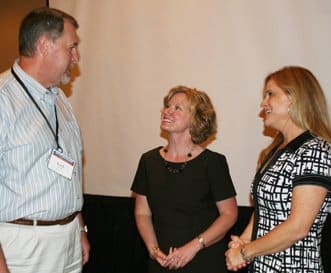TAMPA, Fla. — Sagging financial contributions remain a challenge for the Cooperative Baptist Fellowship, members of the group’s Coordinating Council were told June 22.
Current receipts are running at about 82 percent of the $14.5 million budget for 2010-2011, said Bill McConnell, a Knoxville, Tenn., businessman who chairs the council’s finance committee.

|
“We have to do something to raise revenue,” McConnell, a member of Knoxville’s Central Baptist Church in Bearden, told council members meeting the day before the CBF’s annual general assembly kicks off. “We’re still flat. We’re still where we were last year.”
The 66-member council will recommend to the general assembly this week a reduced operating budget of $12.3 million for 2011-2012, a $2.2 million drop from this year’s budget goal. But if projected trends continue, even that lower figure won’t be met, said McConnell.
Year-to-date receipts are “exactly on track to end up where we were last year,” he said, at around $11.9 million.
“The finance committee agreed on $12.3 million [as a 2011-2012 budget goal] but even that isn’t where we are going to be.”
McConnell said CBF staff is functioning on about 89 percent of its budget to compensate for reduced revenue.
Contributions to the CBF’s Global Missions Offering also are running behind, but CBF executive coordinator Daniel Vestal said an enhanced initiative to increase offering gifts has been “heartening.” The offering’s goal this year, which ends Sept. 30, is $5.5 million. So far about $3.4 million has been collected.
Vestal said he and Ben McDade, coordinator of Fellowship advancement, have had conference calls and meetings with more than 100 pastors and about 155 individual donors as part of a “Keeping the Promises” campaign to close the offering shortfall.
“Frankly, it’s been heartening,” said Vestal. “The pastors have heard our appeals.”
He encouraged the council to consider ways the offering can be adapted to increase support for it.
“People are engaged in missions, involved in missions, giving to CBF, but they are involved in a more designated way,” added Vestal. “The way we’re doing the offering now is not generating the passion we need. There are still a lot of people who want to contribute to an offering but not enough. We need to make some changes.”
Possible changes, he said, could include moving the primary promotion of the offering from Christmas and Easter to Pentecost, or naming the offering as a way of “personalizing” it.
Council members also heard an update on the 2012 Task Force, a panel created a year ago to study the CBF’s future.
Task force chair David Hull said the group has held about 100 listening sessions at state and regional CBF meetings, with a variety of ministry partners and age groups, especially pastors in their 20s and 30s.
“We are listening to the Fellowship community and before we ever make recommendations about the future, we must listen to the hopes and dreams and thoughts and ideas of what is going on now and what has gone on in the past 20 years,” said Hull, pastor of First Baptist Church in Huntsville, Ala.
Hull said the task force’s listening sessions will end in mid-August, when the group will begin to wrestle with its proposals, which will be presented at the council’s February meeting and eventually the 2012 general assembly.
Council members also were briefed on next year’s conference on sexuality and covenant, a collaboration between the CBF and Mercer University to be held April 19-21 at First Baptist Church in Decatur, Ga.
The conference aims to broaden the conversation on church responses to homosexuality which was begun at a breakout session during last year’s general assembly in Charlotte, N.C.
Rick Bennett, director of missional congregations for the CBF, told the council he hopes to have plenary speakers committed by mid-August and small group facilitators lined up by Jan. 1.
“This conference is not designed to come to any conclusion,” Bennett emphasized. “It will resource the conversation.”

